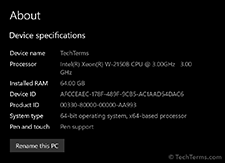x64
x64 is shorthand for 64-bit processor architecture. It is often contrasted with x86 architecture, which refers to 32-bit Intel processors, including the 386, 486, and 586 series. However, x64 refers to all 64-bit processors, regardless of the manufacturer. The "x86-64" label specifies a 64-bit x86 processor.
The primary difference between a 32-bit and 64-bit processor is how the CPU addresses memory. A 32-bit processor can reference 232 or 4,294,967,296 addressable values. A 64-bit processor can access 264 values. 264 is not double 232, but 4,294,967,296 times more. Therefore, a 64-bit processor can reference 18,446,744,073,709,551,616 values.
A 32-bit processor can only access about 4 GB of RAM. A 64-bit processor can access over 4 billion times more memory than a 32-bit processor, removing any practical memory limitations. x64 processors can run 64-bit applications, which are built and compiled for 64-bit hardware.
History
Throughout the 1980s and 1990s, most PC processors were 32-bit. In 1996, Nintendo released the Nintendo 64 gaming console, one of the first mass-market 64-bit devices. Ironically, the console only had 4 megabytes or RAM, or 1/1000th the 4 gigabytes limitation of a 32-bit processor. But it paved the way for more 64-bit processors.
Between 2000 and 2010, x64 processors grew in popularity. Both Microsoft and Apple released 64-bit versions of their operating systems. Since 2010, nearly all desktop and mobile devices have been built with x64 processors. Most applications are now 64-bit as well.
NOTE: In 2019, Apple released macOS 10.15 Catalina, which dropped support for 32-bit applications. As of 2020, Microsoft Windows still supports both 32-bit and 64-bit applications.
 Test Your Knowledge
Test Your Knowledge